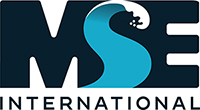MSE leads news consortium awarded £1.06M to address clean maritime challenges in ports and shipping

A consortium of nine organisations, led by MSE International has been awarded £1.06M as part of the Smart Maritime Land Operations Call managed by MarRI-UK and supported by the Department for Transport (DfT). The project, called SPINE, (Shipping and Port Interfaces In the New Era) will advance the automation of operations in the land/water interface, supporting both infrastructure and operations in the port environment.
The project partners of four SMEs, two large companies and three research technology organisations/university will be investigating ship-shore integration from an energy and autonomy perspective, bringing together elements of infrastructure, with data, automation and supporting communications.
By developing the technologies to interface between ships, remote control centres, port operating systems and national energy infrastructure, the SPINE programme brings a systems approach to vessel autonomy and related port infrastructure. The project directly addresses the key themes of Maritime 2050, the Technology and Innovation in UK Maritime Roadmap, Clean Maritime Plan and UK Ports of the Future. The project is being led by maritime sector consortium specialist, MSE International, which engages with a large cluster of over 3000 marine businesses, stakeholders, research institutions and public sector bodies.
Jonathan Williams , Project Director and CEO of MSE International said: “Clean autonomous shipping plays a vital role in the future of maritime logistics, and the land/water interface is key to ensuring its successful operation. SPINE will help to accelerate the transition to zero emission and autonomous shipping in the UK”.
The maritime industry is facing multiple challenges which need to be addressed strategically within a coherent investment plan. One of the most important challenges is decarbonisation (linked to the air quality challenge) articulated in the Clean Maritime Plan. This requires ports to supply diverse energy resources to vessels (including alternative fuels) and in turn to procure those resources reliably from land-based supply chains. Optimising their investment strategy to meet the requirements of current and future vessels, whilst also remaining competitive and avoiding ‘stranded assets’, is a major challenge for ports and their associated supply chains. Global engineering, environmental and strategic consultancy, Ricardo, will lead this work package, working with battery and energy storage experts, Swanbarton and MSE International.
Houlder, which is a leading marine and offshore design and engineering consultancy with sustainability at its core, will address the novel automated berthing and connection systems that will be needed to support on-board energy requirements.
In parallel, rapid advances are now underway with de-crewing of vessels by increasing human-assisted autonomy, at various levels up to fully autonomous ships. Smart and autonomous shipping is reliant on robust datalinks between ship and shore. Establishing these datalinks will support the development of autonomous short sea shipping. Enabling the improved flow of data from ship to shore provides opportunities for additional integration of maritime and land-side operations that are not available via “traditional” shipping. Marico Marine, an independent marine consultancy specialising in services for ports, harbours and energy sectors will lead this work package, working with Frequentis, safety-critical communication and information experts, HydroSurv, innovators in Unmanned Surface Vehicles (USVs) for marine geospatial data, the NOC (National Oceanography Centre), marine research and technology specialists and experts from the University of Plymouth, specialising in AI in marine autonomy.
These trends are presenting operational challenges to ports but also opening up opportunities: by reducing the crewing costs of vessels, more efficient passage plans can become attractive (e.g. slow steaming). Pervasive on-board condition monitoring will allow safe, reliable autonomous passage of MASS vessels and also enable ports to forecast vessel energy demands and to maximise fuel/energy supply resilience.
To be kept up to date with activities, projects and events in the area of maritime decarbonisation, sign up to the MSE Maritime Decarbonisation Interest Group.


